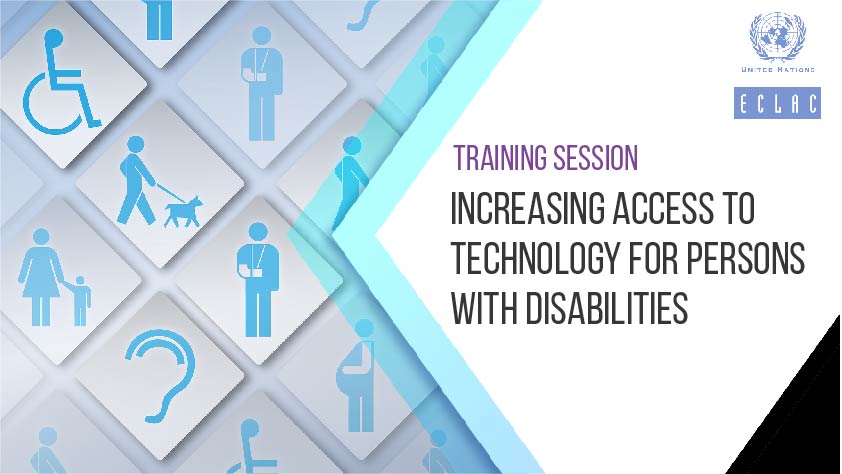Training session on increasing access to technology for Persons with Disabilities
Área(s) de trabajo
Resumen
The training will help participants to better utilise Universal service funds (USFs) to increase access to technology for persons with disabilities thereby supporting governments in the subregion in advancing the implementation of the 2030 Agenda for Sustainable Development and the Convention on the Rights of Persons with Disabilities.
Información del evento

Fecha
23 Oct 2019, 05:30 - 13:30Tipo de evento
Participación
The participants at the workshop will acquire skills and knowledge useful in helping countries to better utilise USFs to increase access to technology for persons with disabilities, including on the latest ICTs available for persons with different types of disabilities and the opportunities they present, improving project proposals to access USF funding, and appointing disability focal points within USFs. The workshop will also provide a space for USF administrators and organizations working with PWDs to share views on the challenges to creating USF projects for PWDs and discuss solutions to these challenges.
This training is aimed at USFs administrators and organisations working with PWDs in English-speaking CDCC Member Countries with USFs, namely Dominica, Grenada, Jamaica, Saint Lucia, Saint Kitts and Nevis, Saint Vincent and the Grenadines, and Trinidad and Tobago. One USF administrator and one disability organisation would be invited from each country, while several interested parties could attend from Trinidad and Tobago.
Contenido relacionado
Agenda
Provisional Annotated Agenda
08:00-08:30 Registration
08:30 – 9:15 Opening session
Ms. Catarina Camarinhas, Social Affairs Officer, ECLAC Subregional Headquarters for the Caribbean will make opening remarks.
Introduction of participants, icebreaker activity, expectations, overview of agenda, training ground rules, distribution of workshop materials.
9:15-10:30 An introduction to ICT Accessibility
This session will discuss concepts of accessibility and the various types of disabilities and disability models and introduce the UN and the UNCRPD definition of disability. There will be an overview of ICT legislation, standards and policies (local, regional, and international). The session then turns to present examples of the assistive technologies and accessible ICTs commonly used by persons with disabilities. The session concludes with a discussion on how specific advancements in ICTs such as voice recognition, virtual reality, machine learning, and AI assistants are creating new forms of assistive technology and accessible ICTs.
10:30-10:45 BREAK and Demo Display
10:45-12:00 Universal Service Funds: projects, key stakeholders, resources and criteria for succes
Universal Service Funds (USFs) are a mechanism that can be used to finance measures to ensure access to ICTs for persons with disabilities. USFs aim to increase access to telecommunication services through a levy on telecommunication providers. In this session, the main elements of a USF project are explained as well as their application on measuring project performance.
What is the purpose of a project proposal?
How to identify a problem or opportunity and propose a solution?
Who benefits? How will it be sustainable? And what is the potential for social impact?
Does the project meet the eligibility criteria of the USFs and align with the SDGs?
What are the key resources needed to implement the solution?
Who are the key project stakeholders and how to gather their support?
Project scheduling and the tools used to manage the project.
How to gain the attention of your audience when writing?
Examples of the various proposal formats.
Research methods and tools to use for gathering information.
12:00-1:00 LUNCH and Demo Display
1:00-2:00 Pitching Session
The purpose of this session is to present and demonstrate project proposal formulation. Participants will come prepared to pitch their projects in under 3 minutes and answer 2 minutes of questions from the audience. The audience will be asked to provide feedback via a menti survey. The allotted time should allow for at least 12 pitches to be heard.
2:00-2:45 Disability inclusive development: implementing accessibility through a focal points system
This interactive session covers the basics and main features of a focal points system within the USFs. Special emphasis is provided on the roles, responsibilities and required skills of a Disability Inclusion Focal Point.
2:45-3:00 BREAK and Demo Display
3:00-4:30 Group exercise: The construction of a project proposal for improving access to technology for PWDs
Participants will be given 1 hour and 30 minutes to work on improving their proposals using the tools and methods presented in the worksheets. The final deliverable would be to complete a first draft of the Project Proposal.
4:30-5:00 Wrap-up and closing remarks
A brief recap of the training tools and methods learned.
Closing remarks.
Evaluation of Training
Sede(s) subregional(es) y oficina(s)
Adjunto(s)
-
Registration form
Information note
Using universal service funds to increase access to technology for persons with disabilities in the Caribbean
Report of expert group meeting on using universal service funds to increase access to technology for persons with disabilities
Opening Remarks: Increasing access to technology for Persons with Disabilities
Presentation: Submission of Project Ideas to the Universal Service Funds in the ECTEL Member States
Presentation: Universal Service Initiative Persons with Disabilities (PwDs)
List of Participants
Enlace(s) relacionado(s)
Contacto
ECLAC Caribbean - Statistics & Social Development Unit
- social-pos@eclac.org